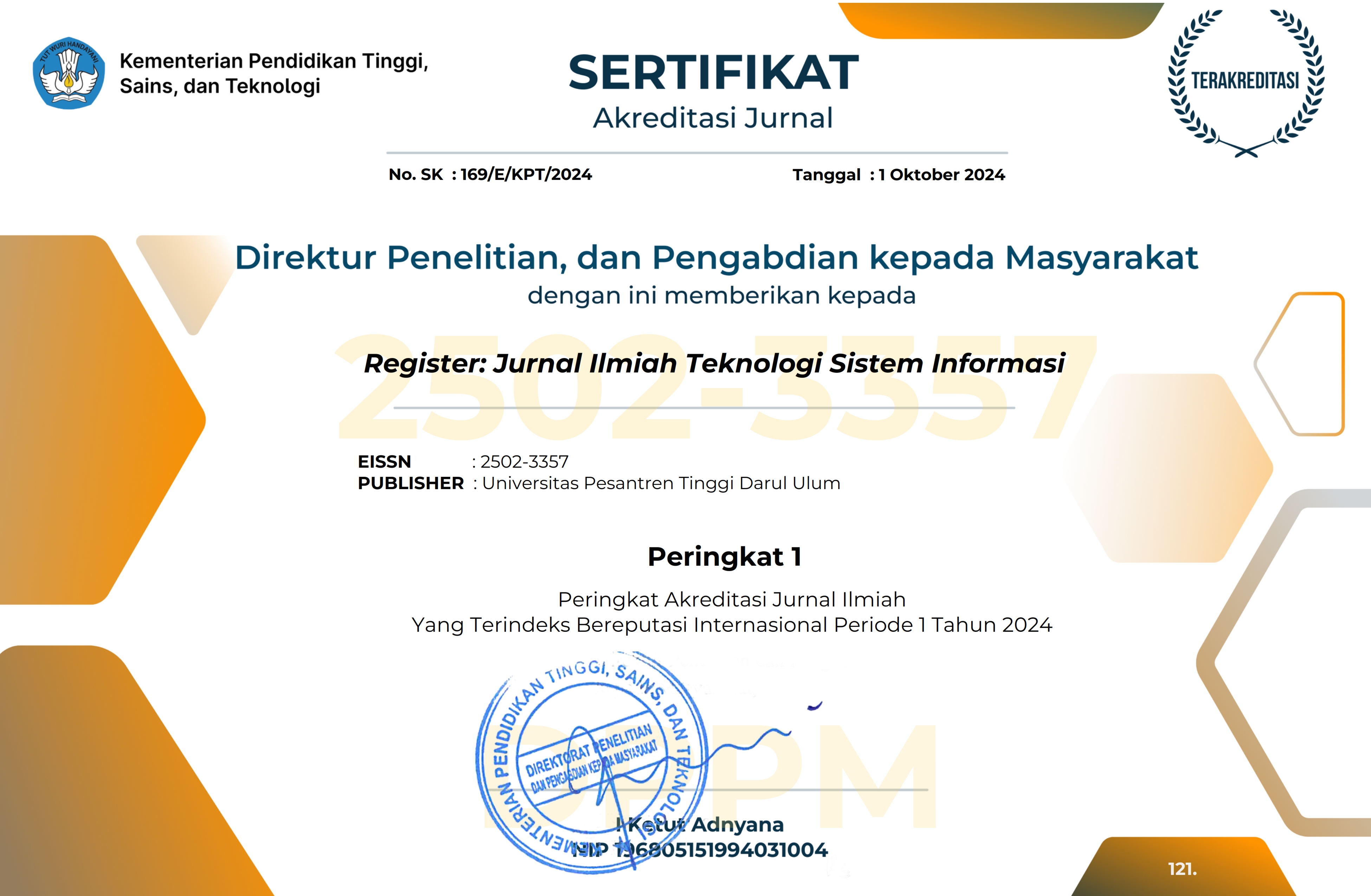Rancang Bangun Sistem Pakar Untuk Mendiagnosis Gangguan Kepribadian Histerik Menggunakan Metode Certainty Factor
https://doi.org/10.26594/register.v1i1.402
Abstract
Gangguan kepribadian histerik atau yang biasa dikenal dengan gangguan kepribadian histrionik merupakan gangguan kepribadian dengan karakter emosi yang meluap-luap, termasuk keinginan berlebihan untuk mendapatkan pujian. Penderita gangguan kepribadian histerik mempunyai tingkah laku yang dramatik dan bereaksi terhadap sesuatu secara berlebihan, serta selalu ingin diperhatikan. Banyak orang yang mengalami gangguan ini, terutama kalangan remaja. Namun sebagian besar dari penderita gangguan ini kurang menyadari kondisinya dan menolak untuk melakukan konsultasi ke psikolog atau psikiater. Oleh sebab itu, dibutuhkan suatu sistem pakar yang dapat membantu untuk mendiagnosis secara mandiri gangguan kepribadian histerik dan mampu memberikan solusi penanganan yang tepat. Sistem tersebut dibangun dengan menggunakan metode waterfall dan metode certainty factor sebagai metode kepakarannya. Hasil dari penelitian ini adalah sistem pakar berbasis web untuk mendiagnosis tingkat gangguan kepribadian histerik. Sistem akan menampilkan nilai kepastian dan tingkat gangguan kepribadian histerik yang dialami pengguna, serta solusi penanganannya. Uji hasil kepakaran dilakukan dengan cara membandingkan hasil diagnosis dari sistem dengan hasil diagnosis dari pakar. Hasil uji kepakaran menunjukkan bahwa hasil diagnosis sistem sudah mendekati kebenaran dari diagnosis seorang pakar. Nilai prosentase sistem sebesar 83,01% dan nilai prosentase pakar sebesar 83,3%. Dengan adanya sistem pakar ini, masyarakat umum dapat melakukan diagnosis mandiri untuk mengetahui tingkat gangguan kepribadian histerik yang dialami serta penanganannya dengan mudah tanpa harus datang ke psikolog.Downloads
References
Depkes. (2014, Oktober 10 ). Stop Stigma dan Diskriminasi terhadap Orang Dengan Gangguan Jiwa (ODGJ).
Hartati, S., & Iswanti, S. (2008). Sistem Pakar dan Pengembangannya. Yogyakarta: Graha Ilmu.
Johar, A., & Palupi, D. D. (2011). Implementasi Metode Frame Untuk Mendiagnosa Gangguan Kepribadian Dramatik Menggunakan Sistem Pakar. Seminar Nasional Aplikasi Teknologi Informasi 2011 (SNATI 2011). Yogyakarta.
Kaplan, H. I. (1997). Sinopsis Psikiatri: Ilmu Pengetahuan Perilaku Psikiatri Klinis. Jakarta: Binarupa Aksara.
Muslim, R. (2011). Buku Saku Diagnosis Gangguan Jiwa Rujukan Ringkas dari PPDGJ III. Jakarta: Bagian Ilmu Kedokteran Jiwa FK Unika Atma Jaya.
Sitorus, R. (2013). Pembangunan Aplikasi Sistem Pakar Analisis Tingkat gangguan Gangguan Kepribadian Menggunakan Teorema Bayes. Yogyakarta: Universitas Atma Jaya Yogyakarta.
Sutojo, T., Mulyanto, E., & Suhartono, V. (2011). Kecerdasan Buatan . Yogyakarta: Andi.
Downloads
Published
How to Cite
Issue
Section
License
Please find the rights and licenses in Register: Jurnal Ilmiah Teknologi Sistem Informasi. By submitting the article/manuscript of the article, the author(s) agree with this policy. No specific document sign-off is required.
1. License
The non-commercial use of the article will be governed by the Creative Commons Attribution license as currently displayed on Creative Commons Attribution-NonCommercial-ShareAlike 4.0 International License.
2. Author(s)' Warranties
The author warrants that the article is original, written by stated author(s), has not been published before, contains no unlawful statements, does not infringe the rights of others, is subject to copyright that is vested exclusively in the author and free of any third party rights, and that any necessary written permissions to quote from other sources have been obtained by the author(s).
3. User/Public Rights
Register's spirit is to disseminate articles published are as free as possible. Under the Creative Commons license, Register permits users to copy, distribute, display, and perform the work for non-commercial purposes only. Users will also need to attribute authors and Register on distributing works in the journal and other media of publications. Unless otherwise stated, the authors are public entities as soon as their articles got published.
4. Rights of Authors
Authors retain all their rights to the published works, such as (but not limited to) the following rights;
Copyright and other proprietary rights relating to the article, such as patent rights,
The right to use the substance of the article in own future works, including lectures and books,
The right to reproduce the article for own purposes,
The right to self-archive the article (please read out deposit policy),
The right to enter into separate, additional contractual arrangements for the non-exclusive distribution of the article's published version (e.g., post it to an institutional repository or publish it in a book), with an acknowledgment of its initial publication in this journal (Register: Jurnal Ilmiah Teknologi Sistem Informasi).
5. Co-Authorship
If the article was jointly prepared by more than one author, any authors submitting the manuscript warrants that he/she has been authorized by all co-authors to be agreed on this copyright and license notice (agreement) on their behalf, and agrees to inform his/her co-authors of the terms of this policy. Register will not be held liable for anything that may arise due to the author(s) internal dispute. Register will only communicate with the corresponding author.
6. Royalties
Being an open accessed journal and disseminating articles for free under the Creative Commons license term mentioned, author(s) aware that Register entitles the author(s) to no royalties or other fees.
7. Miscellaneous
Register will publish the article (or have it published) in the journal if the article’s editorial process is successfully completed. Register's editors may modify the article to a style of punctuation, spelling, capitalization, referencing and usage that deems appropriate. The author acknowledges that the article may be published so that it will be publicly accessible and such access will be free of charge for the readers as mentioned in point 3.



















